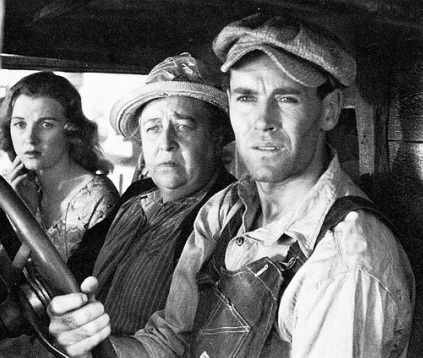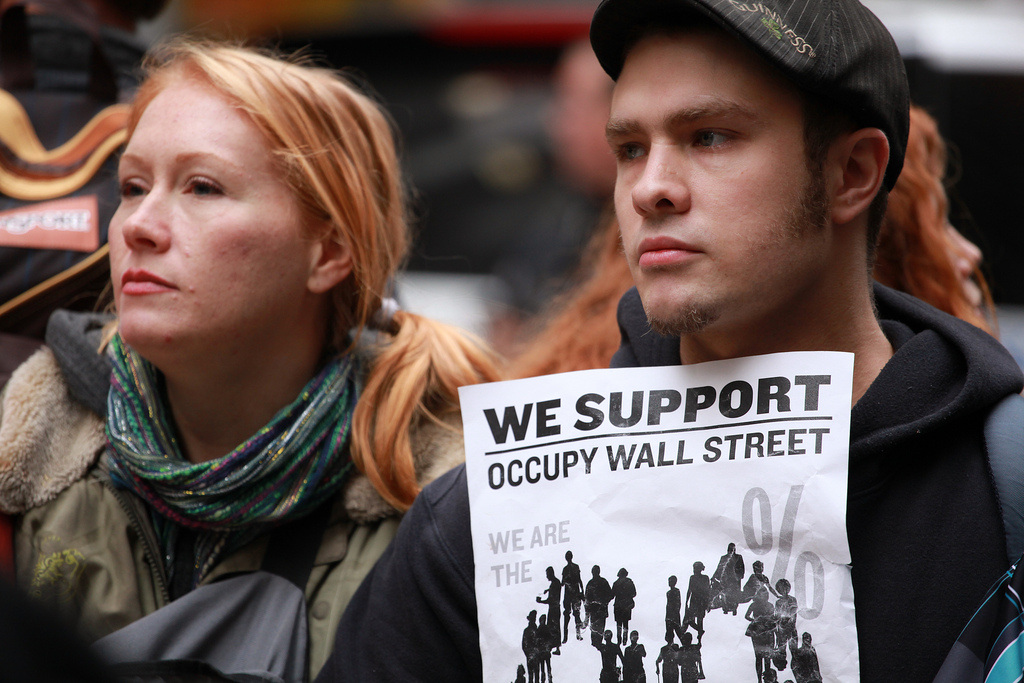Dorothy Day and the Rose of Sharon

"...For those who are huddled in shelters trying to escape the rain... For those who are walking the streets in the all but futile search for work... For those who think that there is no hope for the future, no recognition of their plight -- this little paper is addressed..." And so began the Catholic Worker Movement...
In the midst of the Great Depression, Dorothy Day and Peter Maurin began a "viewspaper" -- The Catholic Worker -- and when folks came knocking on their door to ask if they really meant what they were writing, they brought out a soup pot and fixed dinner for their few guests. And as such things happen, the word spread and hundreds started showing up... and then hundreds of Catholic Worker Houses began all over in the United States, along with a number in other countries as well...
A unique aspect of Dorothy's life and radical witness -- and a fundamental aspect at that -- was that Dorothy wasn't interested in "becoming a saint by doing good". No, not at all! But she was interested in asking why there were hungry people, unemployed people, marginalized people all over this incredibly rich and dynamic and powerful country. Why indeed! She had no hesitation in connecting the dots: monopoly capitalism (in contrast to the traditional American Village cooperative-capitalism), by its very nature, requires that wealth become increasingly concentrated into fewer and fewer hands; monopoly capitalism, by its very nature, requires that many people suffer poverty and degradation as a "cost/benefit" of the "free market system" -- the "greatest system ever invented by man"... at least for the men on the top of the predatory food chain; monopoly capitalism, by its very nature, requires the existence of a permanent war economy -- everyone knows that war is good for business! Dorothy wrote for decades about these issues and summarized her analysis with this pithy statement: "Our problems stem from our acceptance of this filthy, rotten system."
It is essential that monopoly capitalism be contrasted with traditional American Village cooperative-capitalism, which is in line with the thinking of both Thomas Jefferson and Mahatma Gandhi. Gandhi taught, "There is enough for everyone's need, not for everyone's greed." In years gone by, every village, town, and city had their "Ma and Pa Cafe", "Tom's Hardware", "Miller's Feed and General Store" -- someone could repair shoes, everyone had a garden, produce was grown and sold locally: by and large, communities were self-sufficient. Traditional American Village cooperative-capitalism bred satisfaction and contentment -- two hallmarks of safety, health, and well-being. Monopoly capitalism, on the other hand, requires endless growth -- even beyond the capacity of the Earth to sustain. Endless growth requires endless consumption. Between advertisers, credit, guaranteed-to-break products, and the deliberate cultivation of "new and improved" -- dissatisfaction and boredom whiplash lives and entire communities. No one has to be anyone's neighbor in the globalized order of monopoly capitalism...
But what did Dorothy Day (and Thomas Jefferson and Gandhi) want instead of the "filthy, rotten system"? Her answer: "We want land, bread, work, children, and the joys of community in play and work and worship." This is still the dream of the poor of this world! The poor don't want to get drunk on the same power that is destroying both the rich and this planet -- the poor of this world simply want the opportunity to live and to rejoice in the possibilities of their children. Haven't you read John Steinbeck's "The Grapes of Wrath"? (If not, read it!)
And after you've considered the incredible strength of Ma Joad, the powerful commitment of Tom, rest a while thinking about the total transformation of the Rose of Sharon -- from a very small, insignificant, selfish "self", into the Mother of New Possibilities... and the great surprise and truth of "The Grapes of Wrath" -- especially when considering the life of Dorothy Day -- is that there is a Rose of Sharon within all of us...
Now is our time to set our inner Rose of Sharon loose upon this precious blue Planet!
In the midst of the Great Depression, Dorothy Day and Peter Maurin began a "viewspaper" -- The Catholic Worker -- and when folks came knocking on their door to ask if they really meant what they were writing, they brought out a soup pot and fixed dinner for their few guests. And as such things happen, the word spread and hundreds started showing up... and then hundreds of Catholic Worker Houses began all over in the United States, along with a number in other countries as well...
A unique aspect of Dorothy's life and radical witness -- and a fundamental aspect at that -- was that Dorothy wasn't interested in "becoming a saint by doing good". No, not at all! But she was interested in asking why there were hungry people, unemployed people, marginalized people all over this incredibly rich and dynamic and powerful country. Why indeed! She had no hesitation in connecting the dots: monopoly capitalism (in contrast to the traditional American Village cooperative-capitalism), by its very nature, requires that wealth become increasingly concentrated into fewer and fewer hands; monopoly capitalism, by its very nature, requires that many people suffer poverty and degradation as a "cost/benefit" of the "free market system" -- the "greatest system ever invented by man"... at least for the men on the top of the predatory food chain; monopoly capitalism, by its very nature, requires the existence of a permanent war economy -- everyone knows that war is good for business! Dorothy wrote for decades about these issues and summarized her analysis with this pithy statement: "Our problems stem from our acceptance of this filthy, rotten system."
It is essential that monopoly capitalism be contrasted with traditional American Village cooperative-capitalism, which is in line with the thinking of both Thomas Jefferson and Mahatma Gandhi. Gandhi taught, "There is enough for everyone's need, not for everyone's greed." In years gone by, every village, town, and city had their "Ma and Pa Cafe", "Tom's Hardware", "Miller's Feed and General Store" -- someone could repair shoes, everyone had a garden, produce was grown and sold locally: by and large, communities were self-sufficient. Traditional American Village cooperative-capitalism bred satisfaction and contentment -- two hallmarks of safety, health, and well-being. Monopoly capitalism, on the other hand, requires endless growth -- even beyond the capacity of the Earth to sustain. Endless growth requires endless consumption. Between advertisers, credit, guaranteed-to-break products, and the deliberate cultivation of "new and improved" -- dissatisfaction and boredom whiplash lives and entire communities. No one has to be anyone's neighbor in the globalized order of monopoly capitalism...
But what did Dorothy Day (and Thomas Jefferson and Gandhi) want instead of the "filthy, rotten system"? Her answer: "We want land, bread, work, children, and the joys of community in play and work and worship." This is still the dream of the poor of this world! The poor don't want to get drunk on the same power that is destroying both the rich and this planet -- the poor of this world simply want the opportunity to live and to rejoice in the possibilities of their children. Haven't you read John Steinbeck's "The Grapes of Wrath"? (If not, read it!)
And after you've considered the incredible strength of Ma Joad, the powerful commitment of Tom, rest a while thinking about the total transformation of the Rose of Sharon -- from a very small, insignificant, selfish "self", into the Mother of New Possibilities... and the great surprise and truth of "The Grapes of Wrath" -- especially when considering the life of Dorothy Day -- is that there is a Rose of Sharon within all of us...
Now is our time to set our inner Rose of Sharon loose upon this precious blue Planet!
